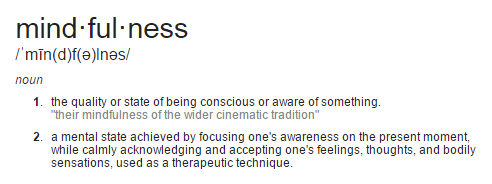

However, it’s a capacity we’ve somewhat lost since fewer of us practice a religion, the speed of life has become faster and the amount of information we process in our daily lives has increased. Forms of it have been practiced in different cultures and faiths for millennia and can be found in Christianity, Judaism, Islam as well as Buddhism. In essence, mindfulness is the process of openly paying attention, with awareness, to our experience in the present moment. This can help us feel calmer, more in control and even more capable. So rather than being on autopilot or at the mercy of our busy life, busy mind or our devices, we can better choose where to place our attention. It helps us notice what we are experiencing and whether it supports or is harmful for our wellbeing, so we can decide where we want to focus. Learning to be mindful enables us to more actively choose where our attention is. We can find ourselves multi-tasking or living much of our life on autopilot, our minds caught up ticking off our to-dos, going over the past, worrying or making plans for the future rather than focusing on the present - what we are doing and experiencing, who we are with or what’s around us. Many of us live very busy lives too, with ever expanding to-do lists, often juggling work or studies, home and taking care of others as well as ourselves. It can also create information overload and fuel social comparison, adding to our stress levels or even causing distress. We can lose hours scrolling on our phone without realising it.

As useful as this technology is, it’s designed to capture and keep hold of our attention. As a result of our devices and social media, there’s a lot more competing for our attention than ever before. Today the skill and practice of mindfulness matters more than ever.


 0 kommentar(er)
0 kommentar(er)
